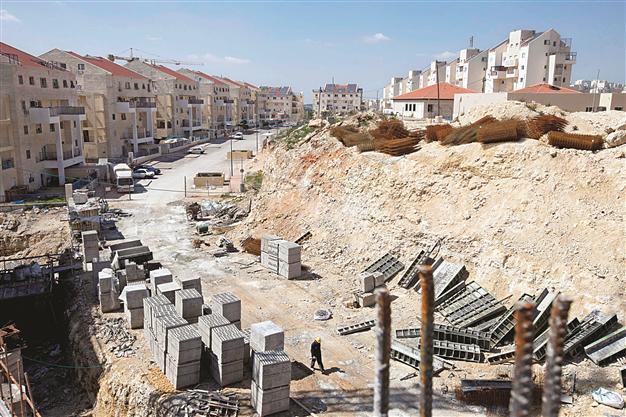Israil faces diplomatic pressure
PARIS / LONDON

This March photo shows a general view of a construction site in the West Bank Israeli settlement of Modiin Illit. AP photo
Israel faced concerted criticism from Europe yesterday over Prime Minister Benjamin Netanyahu’s decision to expand Israeli settlements in the West Bank after the de facto recognition of Palestinian statehood in U.N.
Britain, France and Sweden summoned the Israeli ambassadors in their respective capitals to express deep disapproval of the plan to erect 3,000 more homes in the occupied West Bank and East Jerusalem.
Ahead of a Netanyahu visit this week, Germany, considered Israel’s closest ally in Europe, urged it to refrain from expanding settlements, and Russia said it viewed the Israeli moves with serious concern.
Angered by the U.N. General Assembly’s upgrading on Nov. 29 of the Palestinians’ status in the world body from “observer entity” to “non-member state,” Israel said the next day it would build the new dwellings for settlers, Reuters reported. U.K. Foreign Office Minister Alistair Burt called in Daniel Taub to express Britain’s concerns, Agence France-Presse reported.
“We deplore the recent Israeli government decision to build 3,000 new housing units and unfreeze development in the E1 block. This threatens the viability of the two-state solution,” the Foreign Office said. “We have called on Israel to reverse this decision.” In an earlier statement, the ministry said: “We have told the Israeli government that if they go ahead with their decision, then there will be a strong reaction.”
No German act yetIn Paris, Foreign Ministry spokesman Philippe Lalliot said Israeli Ambassador Yossi Gal had been summoned so France could express its “grave concern” over the settlements plan. The Israeli embassy said Gal had “clarified the Israeli position by explaining that it was impossible to expect Israel to stand idly by after the unilateral Palestinian move at the U.N.” A French Foreign Ministry official, responding to reports Paris might bring its envoy in Tel Aviv home, said, “There are other ways in which we can express our disapproval.” The U.K., meanwhile, dismissed speculation over recalling its ambassador to Israel.
Germany voiced deep concern yesterday about Israeli plans for new settlements but said it would not recall its ambassador to Berlin “for the moment.” Ahead of talks this week between Chancellor Angela Merkel and Netanyahu, German government spokesman Steffen Seibert called on Israel to withdraw its settlements plan. “Israel is undermining faith in its willingness to negotiate, and the geographic space for a future Palestinian state, which must be the basis for a two-state solution, is disappearing,” he said.
Despite strong international condemnation, “Israel will not backtrack on a settlement expansion plan,” an official in Netanyahu’s office said yesterday.
Following the settlement plans, Israel also said it would not transfer tax and tariff funds it collects for the Palestinians this month. The Russian Foreign Ministry said the move would further weaken the dire economic and humanitarian situation in the Palestinian territories. “We are calling on the Israeli side to revisit its plans to expand settlement building and continue transferring the funds to the Palestinians,” the ministry said, adding that the move would help “achieve fair and long-term peace” in the region. “The realization of the new large-scale settlement plans will negatively affect efforts to restart direct talks aimed at achieving a two-state solution of the Israeli-Palestinian conflict,” it said.
The decision to build in a key area east of Jerusalem, called E1, sparked a storm of diplomatic protest from Washington and Brussels as well as from U.N. chief Ban Ki-moon, who warned Dec. 2 that it would deal an “almost fatal blow” to the prospects of resolving the conflict.
